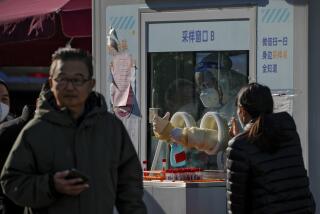Chinese Abuzz Over New Stock Rules
- Share via
SHANGHAI — There’s so much excitement over the government’s decision to let Chinese buy the same stocks as foreigners that officials had to postpone the starting date until today to let banks and securities houses prepare for the onslaught.
China hopes the move will give a shot in the arm to one of the world’s only Communist-run stock markets--and Asia’s third largest--and pave the way for a unified stock market that would eventually be open to all investors.
The government announced its plans Feb. 19, saying it will open the trading of B shares--a tiny market until now reserved for foreigners--to local investors holding legal foreign exchange. It suspended B-share trading for the week, planning to reopen on Monday. But late Friday the China Securities Regulatory Commission gave the exchanges two more days to prepare.
Analysts have hailed the shift as a giant step in the right direction. It is seen as a prelude to a merger of the B market with the much larger, domestic market in A shares, and the eventual opening of that market to foreigners.
But they doubt it’s the Big Bang that would solve the deep-seated problems plaguing a decade-old experiment with stock ownership. Corruption and other woes will take years to root out.
The two-tier system was set up to separate domestic investors who trade in Chinese currency and foreign investors who do so in U.S. dollars. But there is a huge gap between the two. B shares sell at a heavy discount to A shares. If the two become one, it’s inevitable that prices for the latter would suffer, analysts say.
“This adjustment is normal,” said Zhang Jinhui, an investment manager at Huaxia Securities’ office in Shanghai. “It may hurt some people now, but it’s good for the long-term health of the market.”
In fact, for most of last week, the A-share market sank in both Shanghai and Shenzhen, the country’s two stock exchanges. Another decision last week helped to drag down the board: A new policy allows the delisting of companies that lose money three years in a row. This was unheard of in the Chinese equity market, which supports countless unprofitable state-owned enterprises.
Meanwhile, those who can afford it are rushing to the newly available B-share market. Brokerage houses saw their normal traffic jump as much as fivefold last week. “We’re a little caught off guard,” said Wei Xing, a Shanghai B-share broker who worked overtime all last week. “We expect the market to rise by 30% to 50%” when it reopens.
Many would-be buyers, however, left empty-handed after learning more new rules: Only people who had U.S. dollars in the bank before the Feb. 19 announcement are eligible to invest. Those who converted their Chinese currency after the announcement must wait until June to buy shares.
“That’s not fair. By then the prices might drop like the A shares,” said a 60-year-old laid-off factory worker at the Three Gorges securities house in Shanghai. His A shares lost about 10% in value this month.
The B market’s total capitalization is only about $7 billion, or a little more than 1% of A shares, valued at about $550 billion. High-profile domestic firms seeking substantial foreign capital typically go to Hong Kong or Wall Street for their public listings.
“Until now, the B market’s future was looking very grim,” said Zhang at Huaxia Securities. He added that it’s inevitable that the government would turn to its own citizens to bail out cash-starved enterprises.
The new availability of B shares is expected to double the market’s capitalization. Even Hong Kong investors were hopping across the border to Shenzhen this week, hoping to open accounts and cash in on the bull market to come. Analysts warn this might produce a one-time growth spurt. Long-term confidence in the mainland market will take time to cultivate. Its listed firms remain highly opaque and corruption is still rampant.
If reforms continue, however, analysts say the Chinese capital market has the potential to rival the Tokyo stock exchange, currently the leader in the region. Only a truly internationalized equity market could help Chinese companies get access to capital currently available to their global competitors. This will become critical as China prepares for entry into the World Trade Organization.
But among individual Chinese investors, skepticism reigns. Their shares already have taken a beating after a wave of government crackdowns on insider trading and other scandals in recent months. Now the B-share hoopla, by depressing demand for A shares, is eating into their remaining hopes.
“I just want to make some extra money for groceries,” said a 70-year-old grandmother surnamed Li. She lost about $2,500 of pension money she put into stocks. “Now I can’t afford to buy garlic and salt. I sold my TV and refrigerator to make ends meet.” A crowd gathered to vent and a man yelled out, “If the A and B shares merge, then she might lose her bed and her house too!”
More to Read
Sign up for Essential California
The most important California stories and recommendations in your inbox every morning.
You may occasionally receive promotional content from the Los Angeles Times.









